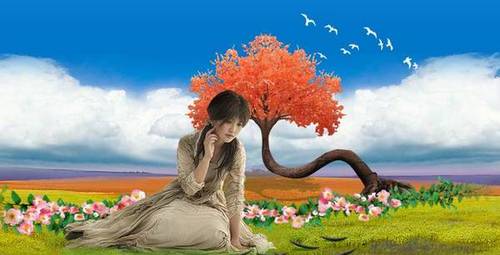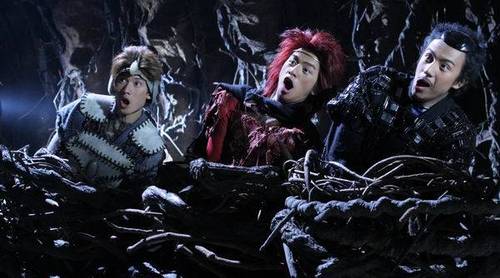At the risk of going out on a limb without a safety net, A Chinese Tall Story is the perfect family entertainment for the New Year holiday. An hilarious, feel-good movie full of lighthearted drama and gut-busting sight gags. More fun, in short, than a barrel of monkeys. To make a tall story short, a long time ago, even before Star Wars, a monk fell in love with a monster and an alien princess. Reduced to twenty-five words or less it doesn't sound like much. But the movie is as impertinent and comical as its director, Hong Kong-born Jeff Lau Chun-wai. |
 |
| |

|
Lau is a playful man, with a permanent smile and ready with the jokes. He's in his fifties, but a child at heart. Much like the Monkey King, one of the characters in this three episode saga, inspired by the Chinese classic, Journey to the West. However, in the latest installment, Lau departs from the source material and delivers a surprisingly modern tale full of witty ideas, colorful characters and dazzling visuals.
|
|
| In the business for more than two decades, Lau's been involved in the production of more than thirty films. He's often associated with Wong Kar-wai (2046); indeed, they are best friends, since they co-funded and co-founded the Jet Tone film company in 1993, a project that was set up to produce both art-house and commercial films (Eagle Shooting Heroes, 1993; Ashes Of Time, 1994; A Chinese Odyssey 2002, 2002). Which is not to say that they think alike. Wong's preference is for realist cinema. Lau, on the other hand, is fascinated by the magic of a medium in which the impossible becomes possible. Thus, Lau's stock-in-trade is the nonsensical, cartoon-ish sight gag. Indeed, Lau spearheaded Hong Kong 's special brand of humor, moleitau (literally 'nonsensical'), and in the process made a name for himself as a sort of Chinese Tex Avery (creator of Daffy Duck, Droopy and Screwy Squirrel). |
|
| He's also made another of his best friends, Stephen Chow Sing-chi, a superstar with a string of unforgettable comedies: All for the Winner (1990); Out of the Dark (1995); and A Chinese OdysseyPart 1 and 2 (1995) to name but a few. If Chow's now known as the 'King of Cantonese comedy', the title, in large part, is due to Lau. |
| |
| Which brings us back to the Monkey King saga, more familiarly known as Journey to the West a work that has no equivalent in Western literature. Ten years ago, Lau wrote a three-chapter screenplay based on the classic sixteenth-century novel written by Wu Cheng-en. (Wu, in turn, was inspired by a real monk, Xuan Zang, who lived during the Tang Dynasty.) Two of Lau's chapters were shot in a row – A Chinese Odyssey: Pandora's Box and A Chinese Odyssey II: Cinderella – with Stephen Chow playing the Monkey King. "We made only two films considering the bad box office at the time," recalls Lau, adding that the period movies were, perhaps, too avant-garde as such. "No one dared invest in a third installment." |
| |
| Of course, what is avant-garde one year, becomes classic the next, or the next. Two years after their release, the films developed a following – on video. A very large following. Today, both films are considered masterpieces. And their acceptance provided both Lau and Chow with an opportunity to display their full potential. |

|
| In the latter's case as a comedian and a thespian. Chow's character, Monkey King or Sun Wukong, is half-human/half-monkey. Born from a rock, he lacks manners and discipline; he's mischievous, yet pure of heart. Brave, too – he frequently challenges gods and monsters alike. It's these qualities that make the cheeky Sun Wukong the best-loved folk character in China . Such is his popularity that disobedient children are often (affectionately) said to be 'As naughty as Sun Wukong'. |
| |
| For those unacquainted with the novel, the 100-chapter Journey to the West is an adventure tale, albeit one filled with humor. It relates the journey of the monk Tripitaka as he travels to India in search of enlightenment and with the purpose of bringing the Buddha's Holy Scriptures to China . Tripitaka, escorted by animal spirits, the Monkey King, the pig monk (Zhu Bajie) and the river/sand monk (Sha Wujing), finds himself in danger any number of times; 81, to be exact. |
| |
| For those of you unacquainted with Chinese TV and cinema, Journey to the West has been adapted almost as many times as Tripitaka broke a sweat on his journey. Still, this rich source material allowed Lau plenty of room for innovation, especially in this third episode. |
| |
| A Chinese Tall Story, budgeted at RMB100 million, is a prequel of sorts, focusing on Tripitaka prior to his famous journey. Lau has also added some bizarre new elements and goofy characters. During the production of Kung Fu Hustle for Stephen Chow in 2003, Lau discovered that the Chinese mainland film industry had mastered the art of computer generated imagery – which was not the case in 1995 – and was confident that they could put his ideas on film. That confidence extended to the decade-old script, which he submitted to the producers at Hong Kong-based film company Emperor Motion Pictures (EMP). "The audience," he declared to his new employers, "is now more receptive to change." |
| |
| But after reading the script, they weren't so sure. For one thing, Lau updated Journey to the West, including a scene featuring UFOs. "When they found out there were flying saucers in the script, they came to check the rushes everyday!" he says with a laugh. |
|
|
| |
| Indeed, Lau's unconventional sense of humor, his blending of parody and slapstick, might well offend the average banker. Though the film's dramatic scenes, that seamlessly combine fantasy and CGI effects, would have that same banker counting the box office receipts. As for the UFOs, Lau says they weren't meant to introduce an element of science fiction, rather the intent is to challenge the Chinese superstition that sky-dwelling gods control the universe. "Once aliens are there, gods stands no chance with their kung fu," says Lau. "Aliens have scanners and guns; they're so powerful!" Well, you can't argue with that. |
| |
| Lau may not be serious about aliens, but he's on firm ground, after ten years thinking about it, with his casting. Tripitaka, the leading character of the film, is played by Hong Kong pop idol Nicholas Tse Ting-fong (The Promise, 2005). In the book, the monk is an honorable, decent man. The same cannot be said for Tse, at least not if you believe what's written about him in the Chinese tabloids. "If I can make the audience believe a not very decent young man can play a decent monk, then the character will be even more powerful," says Lau of his casting strategy, adding that, "It's a huge challenge!" Lau had to be firm with Tse: "I didn't let him do his look à la James Dean," explains Lau. "I didn't want him to be seen as a hero." |
| |
| The supporting players are equally powerful, and cast against type, which is to say different from the characters in the novel. In the film, the three animal spirits are: Xin Wukong (Monkey King), who constantly makes a fool of himself; Se Bajie, a handsome, obedient and innocent version of the Pig, a fallen deity punished for his uncontrolled libido; and Men Shaseng, the sand monk, who hides his naivety behind a mustache. (Without giving too much away, two young girls trap the inept monk in a love triangle.) Then there's the beautiful Princess Xiaoshan from outer space, portrayed by Chinese mainland actress Fan Bingbing (Twins Effect 2, 2004), and the young lizard imp Meyan, played by Hong Kong singer/actress Charlene Choi (All About Love, 2005). The latter, by the way, falls in love with Tripitaka, though that stretches belief. Lau sadistically forced the pop starlet to wear make-up that makes her a match for Quasimodo; her teeth are the stuff of a dentist's nightmare. |
| |
| Less repellant, though equally stunning, the film's visuals are the result of big budget, solid CGI, several months of post-production and experienced artists at the head of every department (action director Corey Yuen, art designer William Chang and visual-effect master Eddy Wong). Indeed, we'll go further: this film's SFX make the Lord of the Rings look as cheap as Ed Wood's Plan 9 from Outer Space. The action scenes, especially those set in outer space, are brilliantly staged and reminiscent of Tsui Hark' s best work in the Legend of Zu, Stars Wars and even a few Japanese animation movies involving giant robots (Macross). If trivia interests you, some of the earth scenes were shot on location at Shennongjia, a gorgeous Chinese national reserve in Hubei province. |
|
 |
In sum, Lau has raised the bar, and brought new life to the tale of Sun Wukong. But best to let the man speak for himself: "When I make a movie, I first think of myself and how I can have fun out of it." Which sounds like a quote from the Monkey King himself. In fact, Lau is an endangered species, one of the few directors who doesn't live for box office receipts and one of few people in show business who hasn't always got an eye on the next project. A good family man, Lau is jovial and cunning, upright and subversive. Who knows, perhaps one day mothers will be saying to their mischievous children, 'You're as naughty as Lau Chun-wai!'
|
|
|
